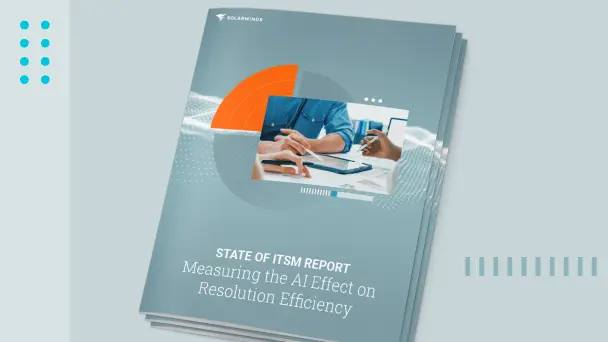In last year's inaugural State of ITSM Report, our focus was on the proven power of automation, knowledge sharing, and self-service. This year, we've returned to our central question—how can IT teams resolve more in less time?—with a new, specific focus: the AI effect.
We dove into anonymized data from thousands of SolarWinds® Service Desk users to measure the precise impact of generative AI on service desk efficiency. The results are in, and they're not just theoretical. The data shows clear, measurable gains.
The Big Number: Slashing Resolution Time
We compared the performance of organizations before and after they enabled generative AI capabilities like automated ticket summaries, suggested responses, and intelligent solution steps.
The result? A significant drop in resolution time.
- Average Resolution Time Before GenAI: 27.42 hours
- Average Resolution Time After GenAI: 22.55 hours
- Average Time Saved Per Incident: 4.87 hours
- Relative Reduction: 17.8%
Saving nearly five hours per incident isn't a minor tweak; it's a fundamental shift, freeing up teams to tackle more complex issues and strategic work.
The Growing "Efficiency Gap"
The "before and after" picture is compelling, but what about the broader landscape? We also compared organizations that have adopted GenAI against a separate group that has not.
This is where a clear performance gap becomes visible.
- Average Resolution Time (Non-GenAI Customers): 32.46 hours
- Average Resolution Time (GenAI Customers): 22.55 hours
- The Difference: GenAI-enabled teams are resolving incidents 9.91 hours faster—a 30.5% relative improvement.
This data indicates a growing divide. The organizations adopting AI are often the same ones already focused on building resilient, scalable operations through automation and self-service. GenAI is proving to be a powerful accelerator for their existing best practices.
What Top Performers Do Differently
Among all the organizations we studied, a small group of "Top 10 Adopters" saw truly staggering results.
- Average Time Before GenAI: 50.98 hours
- Average Time After GenAI: 23.30 hours
- Relative Improvement: A massive 54.3% reduction
How did they do it? Their secret wasn't just having the technology; it was their approach. They didn't treat GenAI as a side project. They fully incorporated it into their daily workflows as a practical tool to support every resolution.
This proves what's possible when AI adoption is paired with strong change management and a commitment to process improvement.
Beyond Tickets: The True Value of Reclaimed Time
What does saving 4.87 hours per ticket really mean for a business? Let's put it in perspective.
Consider a hypothetical mid-sized IT team handling 5,000 incidents annually. By saving 4.87 hours per incident, they would reclaim 24,350 hours of work per year.
This isn't just about cost savings. It's about reinvestment. It’s 24,350 hours that your team can now spend on proactive problem-solving, expanding the knowledge base, or refining automation—transforming IT from a reactive cost center into a proactive, value-driving business partner.
The Future is a Strategy, Not Just a Tool
The 2025 data is clear: Generative AI is delivering a real, measurable efficiency boost.
The biggest gains don't come from just one feature; they come from a holistic strategy. GenAI is a powerful piece of a larger puzzle, working best when combined with well-defined processes, a commitment to knowledge management, and a drive for continuous improvement.
Read the full report: State of ITSM Report 2025 | SolarWinds



